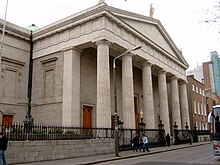Nicholas Donnelly
Nicholas Donnelly | |
|---|---|
 | |
| Born | 23 November 1837 Rathgar, Ireland |
| Died | 29 March 1920 (aged 82) Dublin, Ireland |
| Education | |
| Occupation | Clergyman |
Nicholas Donnelly (23 November 1837 – 29 March 1920), MRIA, was a Roman Catholic auxiliary bishop of Dublin.[1] He was ordained a priest in 1860 and held various positions in the Dublin diocese, and in 1883 became an auxiliary bishop of Dublin and titular bishop of Canea (Crete).[2]
Life
[edit]
Nicholas Donnelly was born 23 November 1837 in Rathgar. He was educated at Castleknock College, before going on the Irish College in Rome. He was ordained in 1860. From 1861 to 1864 Donnelly served as curate at St. Nicholas' Church; he was then stationed at St Mary's Pro-Cathedral until 1879, when he became administrator of St Andrew's Church.[3]
From 1882 to 1894, Donnelly was pastor of Rathgar's Church of The Three Patrons (named after the three patron saints of Ireland: St Patrick, St Bridget and St Columba). It is also known as "The Servants' Church" because, in the late 19th and early 20th century, it was the place of worship for the large number of servants who worked and lived in the large houses in the area.[4] He was made an auxiliary bishop of Dublin in 1883. In 1894, he was appointed parish priest in Bray.

Donnelly was a noted linguist, preacher, historian and musician, and the author of a number of books, such as Short histories of the parishes of the Dublin diocese, as well as pamphlets and translations, such as a translation of Haberl's Magister Choralis. He contributed also to the Catholic Encyclopedia with an article on the Archdiocese of Dublin.[3]
Donnelly had a keen interest in liturgical music and was a member of the Royal Irish Academy of Music, he was also a member of various societies such as the Royal Dublin Society, the Royal Irish Academy, the Royal Society of Antiquaries of Ireland, the Royal Societies Club (London) and the Dante Society of Ireland.
In 1882, on the death of his half sister Mary Boland (née Donnelly), he became guardian of her seven children, five girls and two boys, Patrick and John Pius Boland (who won two olympic medals in 1896 and became an MP for South Kerry).[5] Donnelly raised them as his own, with the assistance of a cousin, Adda Dillon. He was executor of her and her husband Patrick Boland's estate, which included the Boland's Bakery business, which he floated in 1888.[6] Boland's was the largest bakery in Dublin in the late 19th century.
During the Royal visit of Queen Victoria to Ireland in 1900, Donnelly was present at a number of the events during her stay.[7]
He died at his home in Dublin on 29 March 1920.[2][8]
References
[edit]- ^ "Donnelly, Nicholas". Who's Who & Who Was Who. Vol. 1920–2016 (April 2014 online ed.). A & C Black. Retrieved 16 February 2021. (Subscription or UK public library membership required.)
- ^ a b Bishop Nicholas Donnelly Catholic Hierarchy.
- ^ a b "Donnelly, Most Reverend Nicholas", The Catholic Encyclopedia and Its Makers, New York, the Encyclopedia Press, 1917, p. 45
 This article incorporates text from this source, which is in the public domain.
This article incorporates text from this source, which is in the public domain.
- ^ O'Connell, Angela (2004). The Servants' Church: History of the Church of the Three Patrons in the Parish of Rathgar. Dublin: Parish Development and Renewal Core Group.
- ^ Murphy, G. Martin. "Boland, John Pius (1870–1958), politician and tennis player". Oxford Dictionary of National Biography (online ed.). Oxford University Press. doi:10.1093/ref:odnb/58692. (Subscription or UK public library membership required.)
- ^ From Bonn to Athens -- Single and Return. The Diary of John Pius Boland, Olympic Champion Athens 1896 Archived 2012-03-26 at the Wayback Machine edited by Heiner Gillmeister (2008).
- ^ Queen Victoria in Ireland 1900.
- ^ "Death of Auxiliary Bishop of Dublin". The Tablet. Dublin. 24 April 1920. p. 3. Retrieved 26 May 2021 – via Newspapers.com.
